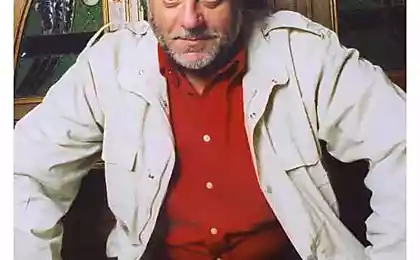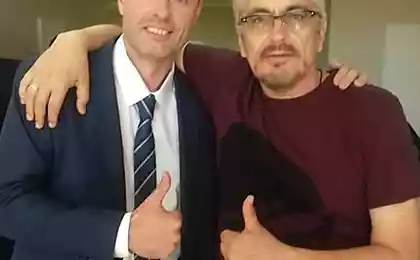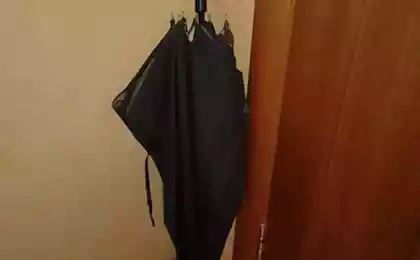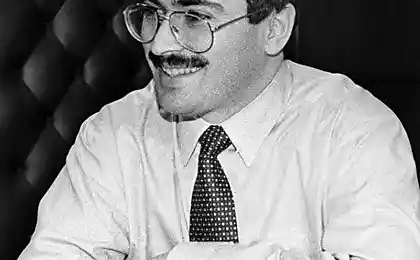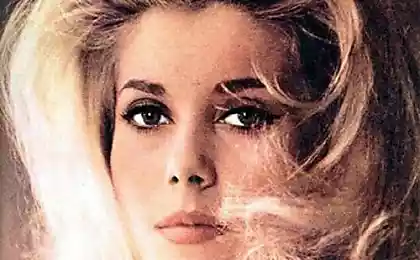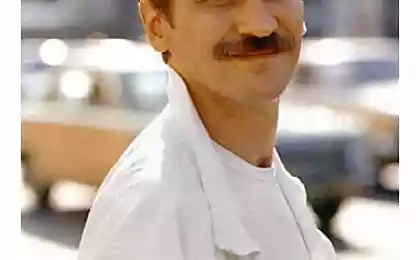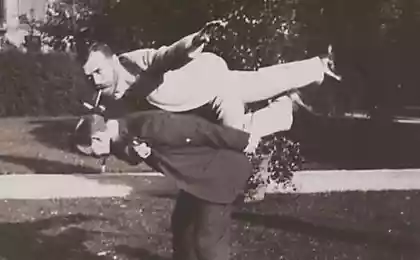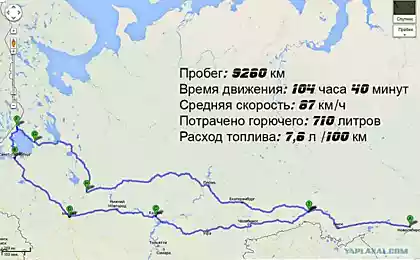1146
Alexander Onufriev: “I looked around and realized: “Sanya, we need to change the Shoto urgently...” Part 2
Anatoly Golubovsky

At Alexander Onufriev, I have only worked once so far. But Sasha himself was remembered - light and cheerful and just as easily and accurately building a mise-en-scene, the friendly atmosphere on the site was remembered. Subsequently, I read more than once in FB his posts about master classes, and then about the upcoming release of the book. You couldn't miss that. The conversation turned out to be very thorough, and for the convenience of perception, the interview is divided into three parts. . . Part 2
What project were you invited to after your portfolio appeared?
- Great love stories. I managed to shoot only one - about Edith Piaf, but the producers rated it as one of the best. After that, there was “Mystic Stories” – also not quite a series, like “documentary”, but with staged shootings. This was the first step in the direction I wanted to go. For actors in terms of money, the project was not the most interesting, but due to acquaintance (remember: cinema is primarily a relationship), I managed to pull up a decent composition and the result was quite watchable.
- What year was that?
If I'm not mistaken, in 2015.
- I mean, relatively recently.
- I've been on TV for over ten years. In the movie, it will soon be 4 years old.
As far as actors are concerned, we have no institution of agents as such. How bad is this for the industry?
- We have agents.
- Units. It's not a system.
At this stage of the development of our market, agents are needed by hyped actors. Our directors and casting directors don’t like working with actors who have agents. There are a lot of problems. There's an agent who has a pool of actors. Let’s say 50 people, of which 5 are top, recognizable, who will always be provided with work. He does not need to make efforts to promote tops, they are in demand. He has enough financial income from them not to parry with the promotion of the remaining 45. Sure, but why?
Here!!
-Yes. And here they are offered a role that is not particularly interesting for money. But working in the cinema is not only a short-term earnings, you need to be able to see the perspective. So, for example, the situation is a promising project, a good director, an interesting role. It seems to be necessary to agree, and the actor agrees, but since he cannot decide himself, the agent says “okay”, but breaks the price at which this project cannot go. An agent doesn't care about an actor's prospects. He wants money here and now. You can't -- whatever, he's got 5 hens laying golden eggs. And the other 45 are sitting without money. I have a friend – a cool actress, I offered her a role in the TV series “Doctor on duty”. Yes, the fee was small, but it was the main role in the series, which could be used in the portfolio, in the show. I had the opportunity to work with a promising director. And she wanted to work. But the agent said, “No, the fee is too low, you’re not going to be filming.” A few months later, we talk to her on occasion. And I'll find out she's not filming anywhere. For a small fee, the agent does not allow filming, and a large one is not offered, because she is not filmed anywhere. It turns out a vicious circle, the girl understands that she does not need an agent because she does not provide work. She is ready to act for 1000-1500 a day, she has to move, and eat, but she has to do it.
That’s why I think we need the Agents Institute, not 5-6 people who “hold the market.” Personally, as an actor, I’m interested in working with an agent who will come to a producer and director and say, ‘Are you going to shoot without Golubovsky?’ Come on. This is his role, without him it will not be the compote. And that, I truly believe, is the mission of an agent.
Well, normally, yes, an agent should be looking for a job for an actor, not just controlling the level of royalties.
- What do you think about the level of scripts of Kiev series?
- Come on, middle level. The dualism is that after the conflict with Russia, the problem arose: to fill the airwaves with your product. And there are a lot of TV series, but people who can write decently are not enough, and the pay is low. Therefore, finding a good screenwriter who would agree to write a product quickly and efficiently for this money is not so easy.
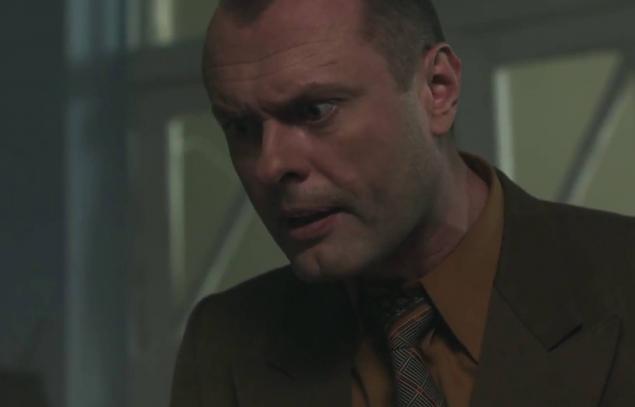
I get it. But at least some level has to be... Well, people can't speak in such inhuman language as scripts. And the circumstances? Well, you know...
You know, the conditions are such that you have to write a lot and quickly. Screenwriters do not have time to think through properly, and after all, a talented thing cannot be written quickly. Again, for meager money, the screenwriter is especially reluctant. On the one hand, not quite professional, on the other hand, I personally will not throw a stone. And another point: scripts of series are often written according to a certain algorithm. One person comes up with a plot, the other breaks into actions, the next splits into episodes, and then they write for dialogue. It's an assembly line. Written and given away. And it's faster, that's right. But, since several people participated in the process in the “surrender-receive” mode, overdrive is inevitable. Yes, one person would do everything better, but much slower, and the deadlines are tight.
What would you change if you had the opportunity?
To me, the only thing missing is time. He's too short to prepare. So, for comparison: if in the days of the Union, it took a year to shoot an hour and a half film, then for me to shoot two 45-minute episodes - two weeks maximum. And when the race begins, you just sprinkle some moments in the park - "Okay, the peeple sucks." It is simply impossible to read and delve into all the vicissitudes. And you end up making a forced deal with yourself.
- Agreed. And the funding?
- That depends on the funding. More time, more money. I have a friend of the director, Vadim Perelman, he made a great series “Treason”. Once in correspondence, I asked how much screen time he filmed in this project in one shooting day. Get some air. Three minutes. What kind of work did I do? 15 to 20... The average is 18 minutes. And here you can no longer sit down to think about how best to shoot, nor discuss the mise-en-scene with the operator, nor conduct a rehearsal with the actors, nor make options for takes ... He shoots a maximum of 3 scenes a day, and I shoot a minimum of 12, and sometimes up to 20. So, neither listen nor think about every scene. I can get to some middle level. But I won't make a masterpiece. And writers have the same trouble...
- But even that peeple's got it.
So there is a certain category of series in the daytime for housewives. The lady in the kitchen, the box in the background, she doesn't even look, but listens from the edge of her ear. Of course, if he looks, he will start spitting. That's fine. There are evening series, mini-series. There is a different approach and other money, not to mention the full meter that any director dreams of shooting.
Now in the West, the trend is that many serious writers go to the series, there is where to turn around with the story, it affected the directors, and the top actors are no longer crooked, but willingly star in the series - the same Spacey, McConaughey, Harrelson. And there the characters are spelled out - not in every full meter you will meet this, and the plot ...
- But there and every series is like a full meter. Photography quality, material level. Of course, the cool actors are pulling up... And so, in principle, the Big Movie could end. Although, on the other hand, the very trip to the cinema, its atmosphere - after all, you can not catch it at home at the screen, there is no effect of the auditorium, crowd effect.
What would you describe as your business card: “Alexander Onufriev did it?”
- You mean all the TV shows, the short meter?
- Everything. I know it's very different, but still
- Well, I wouldn't represent the series. It doesn't depend on you. We've got the material, we need to take it off. And here is a short meter, perhaps, "The Losers Club." Well directed, beautifully shot, well played. And although there the action takes place in one location, the reaction of the hall can be seen - the viewer is satisfied. There's also Zanka. But it is rather a cry of the soul, an experimental film, made not according to the classical canons. Such a banter, funny and ironic. Unfortunately, while these films can not be put in the format of our interview.

- Has the desire to film diminished?
-No, of course not. There is simply no financial opportunity to shoot yourself. But there are three scenarios waiting to happen. I do not expect sponsors and investors, I was disappointed at this point. I am looking for a way to earn what I want. Like it was with the Losers Club.
- And here again, having an agent is very relevant. You can shoot, he can sell. If you were an agent, you would be promoted.
If someone sold me as a director, it would be perfect. When someone knows where my product is needed... I can’t do everything and know the whole market. That is, with the situation “where you were before, we were just looking for you” – “that’s how I could know” – already faced. For example, there is Facebook, but the information will not reach the target audience. Producers are busy people, they don't surf the FB tape. But maybe one day, the right person will be interested.
- Those scenarios that are "waiting for their time" - is it designed for a certain CA or something ideological that you want to tell the world?
- I don't suffer from "messianicism." I mean, I have to show the world something. There are topics that interest me personally. What matters to me is not the opinion of the critics, but the reaction of the audience. These categories often conflict wildly... But, again, the viewer comes first. There was a room for 400 people and no one left. Although I can strain myself, to remove pseudo-philosophical crap, which will provoke multi-orgasm in people who allegedly understand cinema. They will be able to find a pearl in a pile of dung, although it was not there.
- You don't like critics.
- Well, why is that? I'm quite appropriate. Just cinema spectator and festival - very different categories of films. So my films, on the one hand, have prizes at festivals. On the other hand, many festivals do not include my films in the program at all. For example, in the Odessa Film Festival, with all my respect for it and desire to participate, neither Reality nor the Losers Club were selected.
- Why do you think?
Let's just say they don't report to me.
- But do you have any idea?
Well, maybe they think it's not intellectual enough. The laugh of the audience is more important to me. I’m convinced that I’m not making stupid films, each has a certain meaning, idea and positivity, they look in one breath and cause laughter.
- You said "topics that interest me." What are these topics?
- Always different. I’m not (at least I think so) focused on one thing. When I was filming Reality, I was soaring with the dominance of reality shows on our channels, how freaks are dragged into the air, erecting a cult and giving rise to the desire of viewers to conform to these people in order to be recognizable. When I was tired of the general level of pessimism – “everything is bad, nasty, not the way I want it to be,” although there are no objective reasons for it, I made The Losers Club. Well, in "Zainka" I did not lay any deep subtext. I just wanted to make a joke...
- I mean, I don't know what's gonna hook you tomorrow. And that's the beauty.
- Overall, yes. I know that there are directors who have a monotheme and they bring it to the audience in every film they make. At this stage, I have some aspects that are outraged or interested. And I wanted to put it on the screen.
I mean, there's a theme coming down on you...
- Yeah, it's exciting, and it needs to be thrown out. Write the script myself or ask someone to do it, make a film and close it for myself.
To be finished

At Alexander Onufriev, I have only worked once so far. But Sasha himself was remembered - light and cheerful and just as easily and accurately building a mise-en-scene, the friendly atmosphere on the site was remembered. Subsequently, I read more than once in FB his posts about master classes, and then about the upcoming release of the book. You couldn't miss that. The conversation turned out to be very thorough, and for the convenience of perception, the interview is divided into three parts. . . Part 2
What project were you invited to after your portfolio appeared?
- Great love stories. I managed to shoot only one - about Edith Piaf, but the producers rated it as one of the best. After that, there was “Mystic Stories” – also not quite a series, like “documentary”, but with staged shootings. This was the first step in the direction I wanted to go. For actors in terms of money, the project was not the most interesting, but due to acquaintance (remember: cinema is primarily a relationship), I managed to pull up a decent composition and the result was quite watchable.
- What year was that?
If I'm not mistaken, in 2015.
- I mean, relatively recently.
- I've been on TV for over ten years. In the movie, it will soon be 4 years old.
As far as actors are concerned, we have no institution of agents as such. How bad is this for the industry?
- We have agents.
- Units. It's not a system.
At this stage of the development of our market, agents are needed by hyped actors. Our directors and casting directors don’t like working with actors who have agents. There are a lot of problems. There's an agent who has a pool of actors. Let’s say 50 people, of which 5 are top, recognizable, who will always be provided with work. He does not need to make efforts to promote tops, they are in demand. He has enough financial income from them not to parry with the promotion of the remaining 45. Sure, but why?
Here!!
-Yes. And here they are offered a role that is not particularly interesting for money. But working in the cinema is not only a short-term earnings, you need to be able to see the perspective. So, for example, the situation is a promising project, a good director, an interesting role. It seems to be necessary to agree, and the actor agrees, but since he cannot decide himself, the agent says “okay”, but breaks the price at which this project cannot go. An agent doesn't care about an actor's prospects. He wants money here and now. You can't -- whatever, he's got 5 hens laying golden eggs. And the other 45 are sitting without money. I have a friend – a cool actress, I offered her a role in the TV series “Doctor on duty”. Yes, the fee was small, but it was the main role in the series, which could be used in the portfolio, in the show. I had the opportunity to work with a promising director. And she wanted to work. But the agent said, “No, the fee is too low, you’re not going to be filming.” A few months later, we talk to her on occasion. And I'll find out she's not filming anywhere. For a small fee, the agent does not allow filming, and a large one is not offered, because she is not filmed anywhere. It turns out a vicious circle, the girl understands that she does not need an agent because she does not provide work. She is ready to act for 1000-1500 a day, she has to move, and eat, but she has to do it.
That’s why I think we need the Agents Institute, not 5-6 people who “hold the market.” Personally, as an actor, I’m interested in working with an agent who will come to a producer and director and say, ‘Are you going to shoot without Golubovsky?’ Come on. This is his role, without him it will not be the compote. And that, I truly believe, is the mission of an agent.
Well, normally, yes, an agent should be looking for a job for an actor, not just controlling the level of royalties.
- What do you think about the level of scripts of Kiev series?
- Come on, middle level. The dualism is that after the conflict with Russia, the problem arose: to fill the airwaves with your product. And there are a lot of TV series, but people who can write decently are not enough, and the pay is low. Therefore, finding a good screenwriter who would agree to write a product quickly and efficiently for this money is not so easy.

I get it. But at least some level has to be... Well, people can't speak in such inhuman language as scripts. And the circumstances? Well, you know...
You know, the conditions are such that you have to write a lot and quickly. Screenwriters do not have time to think through properly, and after all, a talented thing cannot be written quickly. Again, for meager money, the screenwriter is especially reluctant. On the one hand, not quite professional, on the other hand, I personally will not throw a stone. And another point: scripts of series are often written according to a certain algorithm. One person comes up with a plot, the other breaks into actions, the next splits into episodes, and then they write for dialogue. It's an assembly line. Written and given away. And it's faster, that's right. But, since several people participated in the process in the “surrender-receive” mode, overdrive is inevitable. Yes, one person would do everything better, but much slower, and the deadlines are tight.
What would you change if you had the opportunity?
To me, the only thing missing is time. He's too short to prepare. So, for comparison: if in the days of the Union, it took a year to shoot an hour and a half film, then for me to shoot two 45-minute episodes - two weeks maximum. And when the race begins, you just sprinkle some moments in the park - "Okay, the peeple sucks." It is simply impossible to read and delve into all the vicissitudes. And you end up making a forced deal with yourself.
- Agreed. And the funding?
- That depends on the funding. More time, more money. I have a friend of the director, Vadim Perelman, he made a great series “Treason”. Once in correspondence, I asked how much screen time he filmed in this project in one shooting day. Get some air. Three minutes. What kind of work did I do? 15 to 20... The average is 18 minutes. And here you can no longer sit down to think about how best to shoot, nor discuss the mise-en-scene with the operator, nor conduct a rehearsal with the actors, nor make options for takes ... He shoots a maximum of 3 scenes a day, and I shoot a minimum of 12, and sometimes up to 20. So, neither listen nor think about every scene. I can get to some middle level. But I won't make a masterpiece. And writers have the same trouble...
- But even that peeple's got it.
So there is a certain category of series in the daytime for housewives. The lady in the kitchen, the box in the background, she doesn't even look, but listens from the edge of her ear. Of course, if he looks, he will start spitting. That's fine. There are evening series, mini-series. There is a different approach and other money, not to mention the full meter that any director dreams of shooting.
Now in the West, the trend is that many serious writers go to the series, there is where to turn around with the story, it affected the directors, and the top actors are no longer crooked, but willingly star in the series - the same Spacey, McConaughey, Harrelson. And there the characters are spelled out - not in every full meter you will meet this, and the plot ...
- But there and every series is like a full meter. Photography quality, material level. Of course, the cool actors are pulling up... And so, in principle, the Big Movie could end. Although, on the other hand, the very trip to the cinema, its atmosphere - after all, you can not catch it at home at the screen, there is no effect of the auditorium, crowd effect.
What would you describe as your business card: “Alexander Onufriev did it?”
- You mean all the TV shows, the short meter?
- Everything. I know it's very different, but still
- Well, I wouldn't represent the series. It doesn't depend on you. We've got the material, we need to take it off. And here is a short meter, perhaps, "The Losers Club." Well directed, beautifully shot, well played. And although there the action takes place in one location, the reaction of the hall can be seen - the viewer is satisfied. There's also Zanka. But it is rather a cry of the soul, an experimental film, made not according to the classical canons. Such a banter, funny and ironic. Unfortunately, while these films can not be put in the format of our interview.

- Has the desire to film diminished?
-No, of course not. There is simply no financial opportunity to shoot yourself. But there are three scenarios waiting to happen. I do not expect sponsors and investors, I was disappointed at this point. I am looking for a way to earn what I want. Like it was with the Losers Club.
- And here again, having an agent is very relevant. You can shoot, he can sell. If you were an agent, you would be promoted.
If someone sold me as a director, it would be perfect. When someone knows where my product is needed... I can’t do everything and know the whole market. That is, with the situation “where you were before, we were just looking for you” – “that’s how I could know” – already faced. For example, there is Facebook, but the information will not reach the target audience. Producers are busy people, they don't surf the FB tape. But maybe one day, the right person will be interested.
- Those scenarios that are "waiting for their time" - is it designed for a certain CA or something ideological that you want to tell the world?
- I don't suffer from "messianicism." I mean, I have to show the world something. There are topics that interest me personally. What matters to me is not the opinion of the critics, but the reaction of the audience. These categories often conflict wildly... But, again, the viewer comes first. There was a room for 400 people and no one left. Although I can strain myself, to remove pseudo-philosophical crap, which will provoke multi-orgasm in people who allegedly understand cinema. They will be able to find a pearl in a pile of dung, although it was not there.
- You don't like critics.
- Well, why is that? I'm quite appropriate. Just cinema spectator and festival - very different categories of films. So my films, on the one hand, have prizes at festivals. On the other hand, many festivals do not include my films in the program at all. For example, in the Odessa Film Festival, with all my respect for it and desire to participate, neither Reality nor the Losers Club were selected.
- Why do you think?
Let's just say they don't report to me.
- But do you have any idea?
Well, maybe they think it's not intellectual enough. The laugh of the audience is more important to me. I’m convinced that I’m not making stupid films, each has a certain meaning, idea and positivity, they look in one breath and cause laughter.
- You said "topics that interest me." What are these topics?
- Always different. I’m not (at least I think so) focused on one thing. When I was filming Reality, I was soaring with the dominance of reality shows on our channels, how freaks are dragged into the air, erecting a cult and giving rise to the desire of viewers to conform to these people in order to be recognizable. When I was tired of the general level of pessimism – “everything is bad, nasty, not the way I want it to be,” although there are no objective reasons for it, I made The Losers Club. Well, in "Zainka" I did not lay any deep subtext. I just wanted to make a joke...
- I mean, I don't know what's gonna hook you tomorrow. And that's the beauty.
- Overall, yes. I know that there are directors who have a monotheme and they bring it to the audience in every film they make. At this stage, I have some aspects that are outraged or interested. And I wanted to put it on the screen.
I mean, there's a theme coming down on you...
- Yeah, it's exciting, and it needs to be thrown out. Write the script myself or ask someone to do it, make a film and close it for myself.
To be finished



